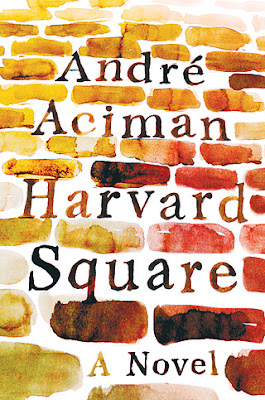A daily journal of our lives (begun in October 2010), in photos (many taken by my wife, Evie) and words, mostly from our home on Chautauqua Lake, in Western New York, where my wife Evie and I live, after my having retired from teaching English for forty-five years in Hawaii, Turkey, and Ohio. We have three children, seven grandchildren, and two great-grandsons, as you will notice if you follow my blog, since we often travel to visit them. : Morning Paddle, 12/06/25 at 8:47 AM
Saturday, June 29, 2013
HARVARD SQUARE: ANDRE ACIMAN
Unfortunately, I wrote a review of this book a couple of weeks ago, but I clearly did not save it so I have to write it again. So here it goes. It's the summer of 1977 and the narrator, whom we assume is Aciman, has just failed his comprehensives in English at Harvard, has the summer to study for them and take them once more in the fall. He's an Egyptian Jew, a fish out of water, so to speak, until he meets Kalaj, a Tunisian Muslim taxi driver, who takes Aciman under his wing, Zorba like, and together, Kalaj teaches the narrator how to live, to argue, to chase women, to eat, to live so to speak, as the two work their way through the hot months of summer, the narrator studying and Kalaj, driving his taxi cab, hoping to get a green card, and gain the respectability he thinks he's been denied because of his ethnicity and religion. He hates everything American, calls everything ersatz, or fake, the school, the government, the American dream, you name it and Kalaj hates it, argues against it until he gets a part time job as a tutor in French at Harvard. He's transformed by this, cleans himself up, stops his posturing until he loses his job because of a lack of green card. From that point, things begin to change as the narrator has learned how to live, like the Boss in Zorba, and no longer needs Kalaj, in fact, he tries to avoid him at all costs. Kalaj falls as the narrator rises, passes his comprehensives, is accepted in the the university and society, as Kalaj gets arrested, for over staying his visa, and the last we hear, he is deported. The narrator is strangely unmoved by this, looking at it as an experience to learn from, grow, and shows little empathy for the Kalaj's demise. We assume the narrator lives happily ever after, but Kalaj must return home in shame, having failed to make it in first Paris, later Cambridge. I liked the book more as I got into it, a little slow me pull me in at the beginning. It has gotten better reviews than I would have expected.
Subscribe to:
Post Comments (Atom)

No comments:
Post a Comment